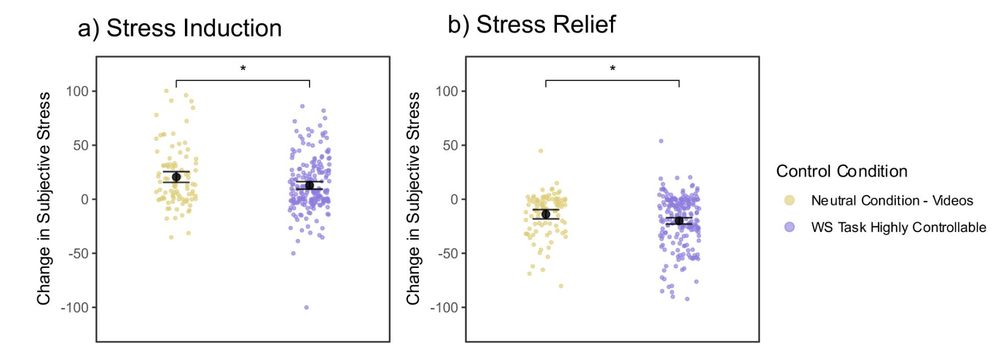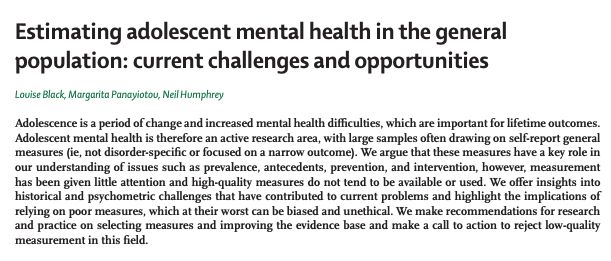
Conceptagion
A concept contagion can be more difficult to wipe out than one for which the vector of spread is more tangible
Heathrow’s terminal 4 was evacuated yesterday as fire crews were called in to investigate “possible hazardous materials”.
Emergency services declared that no “adverse substance” had been found.
So what really happened at Heathrow?
My latest substack:
09.09.2025 06:53 — 👍 46 🔁 15 💬 6 📌 5
We have a ✨NEW PREPRINT✨! Using data from the @clscohorts.bsky.social Millennium Cohort Study and linked healthcare records, we tested the association between social media use and psychiatric diagnoses in secondary care in young people in England. This is still a work in progress - feedback welcome!
14.07.2025 05:59 — 👍 24 🔁 11 💬 3 📌 2
Experienced, bothered by, or both: People differ in how they understand the Patient Health Questionnaire (PHQ) items: https://doi.org/10.31234/osf.io/jcsq8_v1
22.07.2025 12:35 — 👍 20 🔁 9 💬 0 📌 2
Understanding drivers of recent trends in young people’s mental health - Youth Futures Foundation
Research report exploring the reasons for the recent decline in mental health among 14 to 24-year-olds in England
New report on understanding the drivers of declining youth mental health
To effectively respond to worsening mental health, we need to understand not just what is happening, but *why*
We used an evidence-based approach to unpack common explanations
1/🧵
youthfuturesfoundation.org/publication/...
17.07.2025 11:54 — 👍 25 🔁 16 💬 2 📌 0
Less than a week left to apply for this PhD studentship in my lab at @birkbeckpsychology.bsky.social !
Deadline Sun 6th July
01.07.2025 08:35 — 👍 15 🔁 17 💬 1 📌 0
Funded PhD opportunity.pdf
Funded PhD opportunity with @sjblakemore.bsky.social and I, at Cambridge. We are looking for someone interested in developmental science, to start in the coming academic year. Please share it with anyone you think might be interested (see details attached 😁).
drive.google.com/file/d/1RIvg...
27.05.2025 13:49 — 👍 46 🔁 59 💬 2 📌 5
It's been a little while since I've written a Mental Elf blog, and I found this fascinating qual paper on young people's views of CAMHS on TikTok. Give it a read below 👇
15.04.2025 07:05 — 👍 11 🔁 4 💬 0 📌 0
This suggests that feelings of heightened control buffer against stress, and points to control beliefs as a potential target for intervention to reduce the detrimental impact of stressors in everyday life. Stay tuned for more of my PhD work on how these beliefs may be modified! 👀 8/8
28.03.2025 19:20 — 👍 0 🔁 0 💬 0 📌 0

Two graphs showing the change in subjective stress between the two respective timepoints: a) Stress Induction – from before to after the stressor, and b) Stress Relief – from after the stressor to after the stressor debrief. There is higher stress induction and less stress relief for the Neutral Control Condition (videos) compared to the Highly Controllable Condition (Wheel Stopping task)
We found that those who performed the highly controllable Wheel Stopping task had less of an increase in stress in response to the stressor, and a greater decrease in stress after being debriefed that they didn’t have to complete the stressor task after all. 7/n
28.03.2025 19:20 — 👍 0 🔁 0 💬 1 📌 0
In Study 2, we tested whether inducing heightened control from the Wheel Stopping task compared to watching videos (neutral control) buffered against the negative impact of a later stressor, which was of either high or low intensity (preparing a speech or studying a baking recipe). 6/n
28.03.2025 19:20 — 👍 0 🔁 0 💬 1 📌 0

Scatterplot showing the negative association between subjective control and subjective stress during the Wheel Stopping task for both studies. The regression line shows the relationship between subjective control and subjective stress, after accounting for perceived task difficulty and random effects of participant and timepoint.
Feeling more in control was tightly coupled with feeling less stressed during the task, even after accounting for perceived task difficulty. Higher mean subjective control and lower subjective stress were also associated with lower initial state and trait anxiety and depressive symptom severity. 5/n
28.03.2025 19:20 — 👍 0 🔁 0 💬 1 📌 0

Figure with 3 panels: a) Histogram of parameter estimates across all participants showing that there is variation across participants. b) Histogram and box plot of individuals' correlation coefficients between their model predicted and actual control ratings for both studies (the median r for Study 1 = 0.54 and Study 2 = 0.69). c) A plot of control ratings over the time course of the experiment, with control ratings predicted from the model in red, and the actual ratings in blue, shown for 3 randomly selected participants per study. This shows that the model predicted values tightly couple the actual responses.
We developed a Wheel Stopping task to measure and manipulate subjective feelings of control by changing the wheel’s speed, segment size, and deceleration. A linear model showed that trial-by-trial variation in task parameters captured fluctuations in subjective control at the individual level. 4/n
28.03.2025 19:20 — 👍 0 🔁 0 💬 1 📌 0
Decades of learned helplessness research has shown that stress is most potent when uncontrollable, but clear evidence on the impact of *heightened* control over stress in humans is lacking. 3/n
28.03.2025 19:20 — 👍 0 🔁 0 💬 1 📌 0
Stress is a major cause of mental illness across the lifespan. Importantly though, subjective dimensions of stress, such as perceived control, shape the response and later impact that stress can have. 2/n
28.03.2025 19:20 — 👍 0 🔁 0 💬 1 📌 0
Sense of control buffers against stress
Really excited that my first PhD paper is now out in @elife.bsky.social: Sense of control buffers against stress.
This has been a great team effort with Jinyu Shi, Dan McGlade, @docqhuys.bsky.social and Niko Steinbeis, comprising two studies and a total of N=768!
Summary thread below 🧵⬇️
28.03.2025 19:20 — 👍 14 🔁 2 💬 1 📌 1
Testable | Build experiments & surveys | Recruit participants
Testable helps you build a wide range of behavioral experiments and surveys in the simplest and fastest way.
Experimental researchers: Does anyone have experience of collecting data on Testable, and how does it compare to Prolific? (Cost, ease of getting participants, quality of data?)
including @isaacwinterburn.bsky.social here
Thanks!
www.testable.org
04.03.2025 09:39 — 👍 4 🔁 4 💬 0 📌 1
6) British Psychological Society Undergraduate Research Assistantship Scheme - 6 or 8 weeks for penultimate year undergrads. Must find a host (society member) at the same institution and write a project proposal. Deadline 9th March
13.01.2025 15:18 — 👍 0 🔁 0 💬 0 📌 0
Summer Placement Scheme
5) University of Cambridge MRC Cognition and Brain Sciences Unit Summer Internship scheme - 6 weeks for undergrads of any year. Deadline typically mid-end April
09.01.2025 16:02 — 👍 0 🔁 0 💬 1 📌 0
The British Association for Psychopharmacology | BAP Summer Research Internship Scheme
The British Association for Psychopharmacology (BAP) website terms and conditions.
4) British Association for Psychopharmacology (BAP) Summer Internship scheme - 6-8 weeks for undergrads (or masters students if no PhD funding secured). Must find a host (society member) and write a project proposal. Deadline 21st March. @bapsych.bsky.social
09.01.2025 16:02 — 👍 0 🔁 0 💬 1 📌 0

Undergraduate Research Bursary
The next application deadline will be midnight (UK Time) on 1 March 2025. This scheme will finance a number of bursaries to support undergraduates studying psychology or a related discipline in the…
3) Experimental Psychology Society Research Bursaries - 10 weeks for penultimate year undergrads or just graduated (see new graduate bursary on EPS website for the latter). Must find a host (society member) and write a project proposal. Deadline 1st March. @exppsychsoc.bsky.social
09.01.2025 16:02 — 👍 1 🔁 0 💬 1 📌 0

Brandon Davidson on LinkedIn: Science and Policy Internship Advertisement
☀️ We are hiring an undergraduate intern! ☀️
The Digital Mental Health programme (led by Amy Orben) at the University of Cambridge is recruiting our Science…
2) University of Cambridge Science & Policy Internship Scheme - 12 weeks for a current undergrad. Project about screen usage with @orbenamy.bsky.social and UK Government Department for Science. Deadline 14th February
09.01.2025 16:02 — 👍 1 🔁 0 💬 1 📌 0
I've collated a list of *paid* UK summer research internships for undergrads in psychology/neuroscience, ordered by application deadline. Please share with students and add any other opportunities I've missed below!
#psychology #psychiatry #neuroscience #academia #research #internships #undergrad
09.01.2025 16:02 — 👍 10 🔁 5 💬 1 📌 0

Estimating adolescent mental health in the general
population: current challenges and opportunities
Louise Black, Margarita Panayiotou, Neil Humphrey
Adolescence is a period of change and increased mental health difficulties, which are important for lifetime outcomes.
Adolescent mental health is therefore an active research area, with large samples often drawing on self-report general
measures (ie, not disorder-specific or focused on a narrow outcome). We argue that these measures have a key role in
our understanding of issues such as prevalence, antecedents, prevention, and intervention, however, measurement
has been given little attention and high-quality measures do not tend to be available or used. We offer insights into
historical and psychometric challenges that have contributed to current problems and highlight the implications of
relying on poor measures, which at their worst can be biased and unethical. We make recommendations for research
and practice on selecting measures and improving the evidence base and make a call to action to reject low-quality
measurement in this field.
For anyone working in adolescent mental health: I *really* recommend reading this important paper about the most commonly used questionnaires (inc SDQ)
In short: most of them have poor psychometric properties, so do we even know what they are measuring?
www.thelancet.com/journals/lan...
(cont)
05.12.2024 10:30 — 👍 121 🔁 49 💬 9 📌 4
Developing a transdiagnostic, school-based intervention to prevent adolescent mental health challenges 🧠
Led by Prof Essi Viding & Prof Pasco Fearon
@UKRI.org funded
resetproject.co.uk
#MentalHealth #AdolescentWellbeing #ResetProject
Enthusiastic, non-conformist researcher
🦟 Health Data Scientist & Project Manager @isglobal.org
🎓 HIV Course Coordinator @lshtm.bsky.social
🧠 PhD in Paediatric Neurodev @uct-fhs-research.bsky.social
🏳️🌈 They/Them
Behaviour change to address social, health and environmental challenges. Cross-disciplinary, linking policy-makers, practitioners & industry. Reposts ≠ endorsement.
www.ucl.ac.uk/behaviour-change
www.linkedin.com/company/centre-for-behaviour-change-ucl
We're reimagining peer review to grow a diverse new generation of scholars in psychology and neuroscience
Assistant Professor of Cognitive Neuroscience | UConn Psych Sci | attention, cognition, mental health, development, environment, personalized neuroscience
@acornlab.bsky.social
arielleskeller.wixsite.com/attention
appliedcognitionlab.psychology.uconn.edu
The UK’s campaign for improving health opportunities. Together, let's #MakeHealthEqual.
🔗 https://linktr.ee/healthequals
Speaking up for social justice in mental health. Find out more https://www.centreformentalhealth.org.uk/
PI of the https://imaginerealitylab.org/ @uclbrainscience.bsky.social where we investigate the neural and computational mechanisms of mental imagery and reality monitoring. Activist about mental health and EDI in academia. She/her.
computational cognitive science @ nyu. director NYU minds, brains, and machines initiative. https://gureckislab.org. Are you interested in research in my lab? https://intake.gureckislab.org/interest/
🗞️ The best of our journalism
👉 https://www.thetimes.com/
Research Assistant in Computational Psychiatry @UCL Division of Psychiatry & Max Planck UCL Centre for Computational Psychiatry and Ageing Research
📝 https://www.researchgate.net/profile/Nikita-Singh-67
RELMED is a research study focused on improving how we treat depression.
Visit http://relmed.ac.uk for more information.
Postdoctoral Researcher in Computational Neuroscience & Psychiatry
@Yale University | Previously Icahn School of Medicine at Mount Sinai | PhD from UCL Max Planck Centre & Wellcome Trust Centre for Neuroimaging UCL
She/Her
How are mental health problems are portrayed in film, TV and radio – and is it helpful?
A new project from @lucyfoulkes.bsky.social & @isaacwinterburn.bsky.social at the University of Oxford
Professor at KU Leuven | Cognitive (neuro)science | Cognitive control, cognitive aging, insight problem solving, metacognition, agency, citizen science, EEG | Past-Chair of the Psychonomic Society | Lab: https://ppw.kuleuven.be/cogtex | Aspiring runner
Postdoc at the Applied Computational Psychiatry lab at the Max Planck UCL centre. Interested in decision-making, emotions, and mood disorders.
computational psychiatry post doc @ cambridge
https://timothysandhu.github.io/
Continuously learning as an MPT/PhD Candidate at UBC - sustained by home-baked goods, reading binges, hockey nights, and sci-fi adventures ✨
She/Her | Views are my own
We are the network of 15 NIHR (@nihr.bsky.social) Applied Research Collaborations (ARCs)
ARCs support applied health and care research across the country
💙
linktree: linktr.ee/nihrarcs
e-newsletter: tinyurl.com/ARCsnewsletter
website: tinyurl.com/NIHRARCs
The Applied Research Collaboration (ARC) South London is one of 15
@nihrarcs.bsky.social
We work with our partners on applied health and care research.







